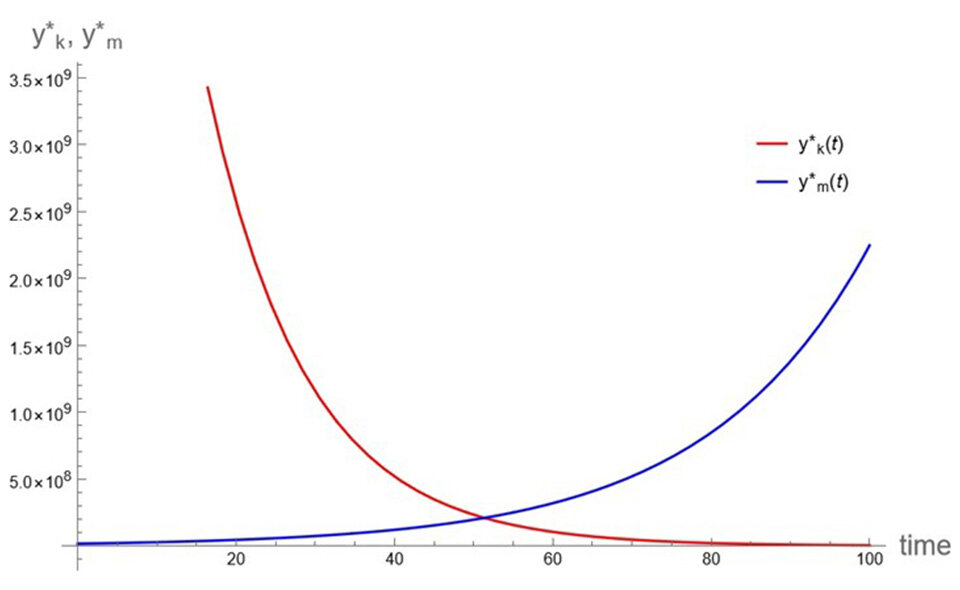2025.09.08 Monday
Scientists Uncover Key to Decoupling Economic Growth from Pollution in Developing Countries
New mathematical framework shows the compatibility between economic growth and environmental sustainability in developing countries using the kindergarten rule

Balancing environmental conservation with economic progress is one of the most pressing challenges of our time. This is particularly difficult for many developing countries, which urgently need to lift their populations out of poverty while grappling with the increasing degradation of their environment. Unfortunately, a common belief is that these nations have to choose between economic growth and a clean environment—a situation made more complex by their reliance on foreign aid.
While the United Nations Sustainable Development Goals provide a global roadmap for tackling such issues, a theoretical understanding of how developing countries can actually achieve these goals is missing. Specifically, there's no robust theoretical framework to analyze how foreign aid can be strategically leveraged to simultaneously achieve economic progress and environmental sustainability.
Now, a recent study published online in the journal The Singapore Economic Review on August 06, 2025, provides this much-needed framework. The research was led by Professor Hideo Noda of the Faculty of Business Administration, Department of Business Economics at Tokyo University of Science (TUS), Japan, and co-authored by Ms. Fengqi Fang, a PhD candidate in Business Administration from the Graduate School of Business Administration at TUS. "This work is related to a 2021 study by Noda and Kano, who demonstrated that zero-emissions policies and sustainable economic growth are theoretically compatible. However, their model assumed developed countries with mature, innovation-driven, knowledge-based economies," explains Prof. Noda. "Therefore, the motivation for our study was to prove that zero-emissions policies and sustainable economic growth are compatible even in developing countries that rely on official development assistance for a significant portion of their government revenue."
Thus, this study is positioned as a continuation of the study by Noda and Kano (2021).
To explore this complex problem, the researchers constructed two types of economic growth models: a public goods model and a congestion model. The public goods model assumes that government services like infrastructure or education are freely available to everyone without competition. In contrast, the congestion model takes into account how an increase in a country's population can reduce the effectiveness of public services.
These two models allowed the researchers to analyze and simulate different economic scenarios in developing nations. Their goal was to understand the conditions under which a government could successfully implement a 'zero-emissions policy'—a policy that reduces net pollution emissions to zero. The study also examined if such a policy could be compatible with sustained economic growth. The researchers then compared the results from both models to see how the presence of congestion in public services might affect a country's ability to achieve these goals.
Overall, the study's findings are optimistic and offer a clear path forward. Both models suggest that a zero-emissions policy and sustainable economic growth are compatible in developing countries receiving foreign aid. However, this requires a developing country's gross domestic product per person to surpass a specific minimum threshold to successfully implement the zero-emissions policy. The researchers called this threshold the 'kindergarten rule level of pollution abatement,' referencing a basic principle commonly taught in kindergarten: "if you make a mess, clean it up yourself."
This important threshold depends on several factors, including the level of clean technology available in the country, population size, the amount of foreign aid received, and how much of that aid is specifically designated for environmental protection. Interestingly, the research shows that countries with better clean technology or larger populations can achieve zero emissions at lower income levels. Notably, the mathematical models revealed that when governments set effective tax policies to boost economic growth, countries can reach the necessary income threshold in finite time. The researchers verified this via numerical simulations, using real-world parameters.
The findings underscore the importance of foreign aid as a catalyst for the transformations needed and suggest ways to accelerate these processes. For example, receiving countries should prioritize using foreign aid to invest in cleaner production technology, whereas donor countries could allocate a larger portion of their aid specifically to environmental programs and clean-tech development.
"Our research will help people in developing countries who believe that it is difficult to achieve both environmental conservation and economic growth," concludes Prof. Noda. "I hope this will be an opportunity to change the mindset of such people."

Image title: Quantitative analysis of how developing countries reach the kindergarten rule level of pollution abatement
Image caption: This plot, derived using a specific configuration with the public goods model, shows the minimum GDP per capita threshold to implement a zero-emissions policy (in red) and the GDP per capita when the labor
income tax rate that maximizes the growth rate of GDP per capita is selected (in blue). The intersection between these two functions implies that the threshold to successfully implement a zero-emissions policy can be reached in finite time.
Image credit: Professor Hideo Noda from Tokyo University of Science, Japan
Image link: https://www.worldscientific.com/doi/10.1142/S0217590825500304
License type: CC BY 4.0
Usage restrictions: Credit must be given to the creator.
Reference
| Title of original paper | : | Zero-emissions Policy and Sustainable Economic Growth in Developing Countries Receiving Foreign Aid |
| Journal | : | The Singapore Economic Review |
| DOI | : | 10.1142/S0217590825500304 |
About The Tokyo University of Science
Tokyo University of Science (TUS) is a well-known and respected university, and the largest science-specialized private research university in Japan, with four campuses in central Tokyo and its suburbs and in Hokkaido. Established in 1881, the university has continually contributed to Japan's development in science through inculcating the love for science in researchers, technicians, and educators.
With a mission of "Creating science and technology for the harmonious development of nature, human beings, and society," TUS has undertaken a wide range of research from basic to applied science. TUS has embraced a multidisciplinary approach to research and undertaken intensive study in some of today's most vital fields. TUS is a meritocracy where the best in science is recognized and nurtured. It is the only private university in Japan that has produced a Nobel Prize winner and the only private university in Asia to produce Nobel Prize winners within the natural sciences field.
■
Tokyo University of Science(About TUS)

About Professor Hideo Noda
from Tokyo University of Science
Dr. Hideo Noda obtained a PhD and a Master's degree in Economics from Kyushu University. He joined TUS in 2013, where he currently serves as Professor at the Department of Business Economics, Faculty of Business Administration. His research focuses on the mechanisms of economic growth and business cycles, zero-emissions policies, and work-life balance. He has published over 50 peer-reviewed papers on these topics with more than 100 citations. He has been awarded the "Best Poster Award" in 2015.
Official TUS website 
Funding information
This work was supported in part by a Grant-in-Aid for Scientific Research (C) (20K01639) from the Japan Society for the Promotion of Science.

